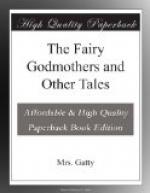The poor tree was marked for felling! Ambrosia was almost affected to tears, once more. The scene was so beautiful, and the allusion so touching, and there seemed to her such a charm over her God-daughter Hermione; she was herself so glad, too, to feel sure that success had crowned her gift, that, altogether, her Fairy heart grew quite soft. “You may do as you like about observing Hermione further,” cried she. “But, for my part, I am now satisfied. She is enjoying life to the uttermost; all its beauties of sight and sound; its outward loveliness; its inward mysteries. She will never marry but from love, and one whose heart can sympathise with hers. Ah, Ianthe, what more has life to give? You will say, she is not beautiful; perhaps not for a marble statue; but the grace of poetical feeling is in her every look and action. Ah, she will walk by the side of manhood, turning even the hard realities of life into beauty by that living well-spring of sweet thoughts and fancies that I see beaming from her eyes. Look at her now, Ianthe, and confess that surely that countenance breathes more beauty than chiselled features can give.” And certainly, whether some mesmeric influence from her enthusiastic Fairy Godmother was working on Hermione’s brain, or whether her own quotation upon the doomed tree had stirred up other poetical recollections, I know not; but as she was retracing her steps homewards, she repeated to herself softly but with much pathos, Coleridge’s lines:[2]
“O lady,
we receive but what we give,
And in our life
alone does nature live:
Ours is her wedding-garment, ours her
shroud!
And would we aught behold, of higher worth,
Than that inanimate cold world allowed
To the poor loveless ever anxious crowd,
Ah! from the soul itself must issue forth
A light, a glory, a fair luminous cloud
Enveloping the
earth—
And from the soul itself must there be
sent
A sweet and potent voice, of its own birth,
Of all sweet sounds the life and element!”
[2] Coleridge’s “Dejection: an Ode.”
And, turning through the little handgate at the extremity of the wood, she pursued the train of thought with heightened colour in her cheeks—
“I may not hope from outward forms
to win
The passion and the life, whose fountains
are within.”
And thus Hermione reached her home, her countenance lighted up by the pleasure of success, and the sweet and healthy musings of her solitary walk.
She entered the library of a beautiful country house by the low window that opened on to the lawn, and found her mother reading.




